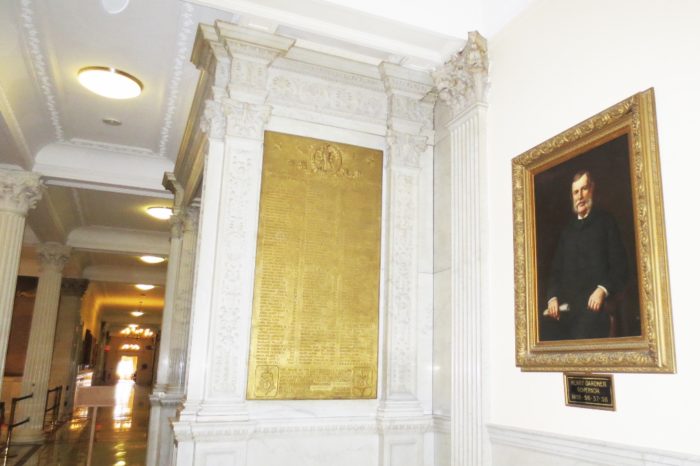Guest Opinion: Time to end Know-Nothing legacy once and for all
“Who was so wild … [to think] that a party unheard of … with a self-chosen cognomen as ridiculous as satire itself could invent … would suddenly spring up … [and] absorb the elective strength of the state …?”
— William Lloyd Garrison, The Liberator, 1854
Last summer, South Carolina drew national media attention when its leaders removed the Confederate flag from its statehouse grounds. Here in Massachusetts, we prominently display bigoted symbols of the Know-Nothing Party in our statehouse and enthrone them in our state constitution; our symbols are even older than the Confederacy.
In the 1840s, the mass immigration of tens of thousands of souls fleeing the Irish potato famine fueled the commonwealth’s economic engine, which was driven by powerful railroads, factories, telegraph lines, and banks. Irish Catholics only sought what all immigrants look for in America: refuge from tyranny, religious freedom, and jobs.
As Alexis de Tocqueville, the early 19th-century French political thinker, himself a Catholic, had observed about religion in the Age of Jacksonian Democracy, “America is the most democratic country in the world, and it is at the same time the country in which the Roman Catholic religion makes the most progress.”
But, by the early 1850s, Massachusetts had abandoned its religious tolerance. The American Party, or Know-Nothings, plotted its anti-immigrant rise in fraternal lodges, “cocoon(s) of secrecy,” according to one historian. Code-named “Sam,” they assured clandestine party membership with peculiar handshakes and the password, “I know nothing.”
In the 1854 state election, the Know-Nothings rode a cunning platform of anti-Catholic nativism and progressive reforms to the largest electoral landslide in Massachusetts history. “Sam” unmasked itself in the voting booths, sweeping every constitutional office in the state, and winning all but three legislative seats.
Led by their governor, Henry J. Gardner, along with his legislative super-majority, the Know-Nothings promulgated a flood of anti-constitutional laws designed to “Americanize America.”
In the most noted example, the Know-Nothings’ nativist “Anti-Aid” constitutional amendment prevented disbursement of state funds and local tax revenues to parochial schools, a practice which the Massachusetts Constitution had previously permitted.
Appallingly, today Gov. Gardner’s statehouse portrait hangs right next to the main entrance of the Massachusetts House of Representatives. Likewise, the Know-Nothings’ bigoted amendment continues to reside cozily within our state’s constitution.
More than 150 years later, Gardner’s nativist “Anti-Aid” amendment is an infamous legacy that still endures. In 1917, a revised amendment was passed, and together these two constitutional sons of “Sam” continue to insult the integrity of both our educational system and state laws.
The Anti-Aid Amendments still serve as legal barriers to improving our children’s education. The Know-Nothings’ amendments prevent more than 100,000 urban families in Massachusetts with children in chronically underperforming districts from receiving scholarship vouchers that would grant them greater school choice.Removal of these amendments, which were conceived in prejudice, would help revitalize the urban educational landscape in Massachusetts. In essence, school funding from the state could follow the student, as it does in higher education across America. Parents would be able to choose from a wide variety of private, parochial, public charter, vocational-technical and religious school options for their children.
Removal of these amendments, which were conceived in prejudice, would help revitalize the urban educational landscape in Massachusetts. In essence, school funding from the state could follow the student, as it does in higher education across America. Parents would be able to choose from a wide variety of private, parochial, public charter, vocational-technical and religious school options for their children.
School choice critics frequently claim that having a choice would draw religion into the public domain. However, having individual parents, not the state, utilize scholarship vouchers to select the most appropriate schools for their children respects the highest spirit of Thomas Jefferson’s desire to keep “a wall of separation between church and state.”
By self-selecting their communities and schools, wealthy families have long had these options available to them. Many poor children are prevented from accessing the same educational opportunities.
Massachusetts has the oldest and worst Know-Nothing amendment in America, and Gov. Gardner was its poster boy. This St. Patrick’s Day, we should honor the commonwealth’s Irish heritage by appealing to our “better angels” when it comes to religious freedom and schooling.
We can accomplish this by lawfully expelling the Know-Nothings’ anti-Irish-Catholic amendment from our state’s constitution. An important first step would be to remove Gardner’s portrait from a position of prominence in our Statehouse.
Jamie Gass directs the Center for School Reform at Pioneer Institute, a Boston-based think tank.



